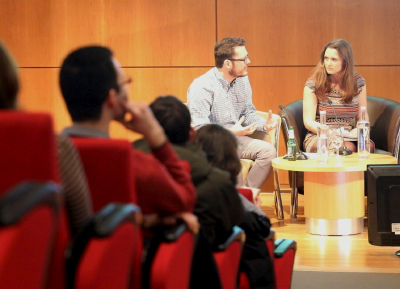LifeLab - Free events highlight discovery on your doorstep
LifeLab has launched an exciting programme of events for Friday 28 and Saturday 29 September, to transform parts of Cambridge and Peterborough into centres of discovery and opportunity for the weekend. Most of the events in shopping centres, cafes and public spaces are free, with a range of activities to inspire all ages and interests.

LifeLab aims to reach out to all communities, including people who haven’t engaged much with science or research before. The events focus on discovering the world around us, and the pioneering life science and opportunities on our doorsteps. Before the weekend events, there are also some warm-up activities in schools throughout Cambridgeshire to help reach a wider audience.
“We’re incredibly excited to launch the LifeLab programme and look forward to welcoming people to our great programme of events. We’ll be shining a light on our region’s great strengths and opportunities in life sciences, including the many and varied career opportunities available.”
Dr Kenneth Skeldon LifeLab lead from Wellcome Genome Campus Public Engagement
LifeLab is led by Wellcome Genome Campus Public Engagement, with partners including the Wellcome Sanger Institute, the European Bioinformatics Institute (EMBL-EBI), Babraham Institute, the University of Cambridge and the MRC Laboratory of Molecular Biology.

The full programme of events is available at www.camlifelab.co.uk. Events in the Grand Arcade and Grafton Centre in Cambridge and the Queensgate shopping centre and Cathedral Square in Peterborough are free. Other events may require advanced booking or paid entry on the door. Following @camlifelab on Twitter, Facebook or Instagram is an excellent way to keep up to date with details and get a glimpse of what’s happening behind the scenes as excitement builds.
“With such a diverse programme, we’re hoping that there’s something for everyone. Primarily, we’re looking forward to sharing and celebrating an aspect of our region that has put it on the global map. LifeLab is providing us with the opportunity to try new things in new places and we can’t wait!”
Laura Pellegrini From the MRC Laboratory of Molecular Biology, one of the many scientists involved in LifeLab
More information
About LifeLab
LifeLab brings the latest discoveries and technologies right to your doorstep. We’ll be taking over public spaces around Cambridge and Peterborough to bring you an exciting programme of mostly free events, games and activities that will give you a new view on the amazing world around you. We aim to share the excitement of scientific discovery and stories from the people behind the science.
LifeLab is one of four projects in the UK and one of 55 across the whole of Europe funded by the European Commission under the Marie Skłodowska-Curie actions programme. European Researcher’s Night* runs annually over the last Friday night in September (28th/29th in 2018).
The teams behind LifeLab represent world-leading research organisations with unique stories to share.
For more information visit www.camlifelab.co.uk and follow the LifeLab social media accounts @camlifelab on Twitter, Facebook and Instagram.
*More information about European Researchers Night can be found here:
https://ec.europa.eu/research/mariecurieactions/news/2018/european-researchers-night-2018-2019_en
Selected websites
Wellcome Genome Campus Public Engagement
Through a wide range of projects, activities, visits and events Wellcome Genome Campus Public Engagement encourages exploration and discussion about genomics, from exciting research findings to the social and ethical questions it can raise. Working together with collaborators in scientific research, the arts and humanities, public engagement and education specialists, and cultural organisations, we aim to share knowledge, spark discussions, and foster a community of engaged researchers. Wellcome Genome Campus Public Engagement is part of Connecting Science. http://publicengagement.wellcomegenomecampus.org/
The Wellcome Sanger Institute
The Wellcome Sanger Institute is one of the world's leading genome centres. Through its ability to conduct research at scale, it is able to engage in bold and long-term exploratory projects that are designed to influence and empower medical science globally. Institute research findings, generated through its own research programmes and through its leading role in international consortia, are being used to develop new diagnostics and treatments for human disease. To celebrate its 25th year in 2018, the Institute is sequencing 25 new genomes of species in the UK. Find out more at www.sanger.ac.uk or follow @sangerinstitute on Twitter and Facebook.
European Bioinformatics Institute (EMBL-EBI)
The European Bioinformatics Institute (EMBL-EBI) is a global leader in the storage, analysis and dissemination of large biological datasets. We help scientists realise the potential of ‘big data’ by enhancing their ability to exploit complex information to make discoveries that benefit humankind. We are at the forefront of computational biology research, with work spanning sequence analysis methods, multi-dimensional statistical analysis and data-driven biological discovery, from plant biology to mammalian development and disease. We are part of EMBL and are located on the Wellcome Genome Campus, one of the world’s largest concentrations of scientific and technical expertise in genomics. www.ebi.ac.uk
The Babraham Institute
The Babraham Institute undertakes world-class life sciences research to generate new knowledge of biological mechanisms underpinning ageing, development and the maintenance of health. Our research focuses on cellular signalling, gene regulation and the impact of epigenetic regulation at different stages of life. By determining how the body reacts to dietary and environmental stimuli and manages microbial and viral interactions, we aim to improve wellbeing and support healthier ageing. The Institute is strategically funded by the Biotechnology and Biological Sciences Research Council (BBSRC) through an Institute Core Capability Grant and also receives funding from other UK research councils, charitable foundations, the EU and medical charities. www.babraham.ac.uk
The University of Cambridge
The mission of the University of Cambridge is to contribute to society through the pursuit of education, learning and research at the highest international levels of excellence. To date, 98 affiliates of the University have won the Nobel Prize. Founded in 1209, the University comprises 31 autonomous Colleges, which admit undergraduates and provide small-group tuition, and 150 departments, faculties and institutions. Cambridge is a global university. Its 19,000 student body includes 3,700 international students from 120 countries. Cambridge researchers collaborate with colleagues worldwide, and the University has established larger-scale partnerships in Asia, Africa and America. The University sits at the heart of the ‘Cambridge cluster’, which employs 60,000 people and has in excess of £12 billion in turnover generated annually by the 4,700 knowledge-intensive firms in and around the city. The city publishes 341 patents per 100,000 residents. www.cam.ac.uk
MRC Laboratory of Molecular Biology
The Medical Research Council (MRC) Laboratory of Molecular Biology (LMB) is one of the world's leading research institutes. Discoveries and inventions developed at the LMB, for example DNA sequencing and methods to determine the structure of proteins, have revolutionised all areas of biology. Its scientists work to advance understanding of biological processes at the molecular level. This information will help us to understand the workings of complex systems, such as the immune system and the brain, and solve key problems in human health. http://www2.mrc-lmb.cam.ac.uk/


